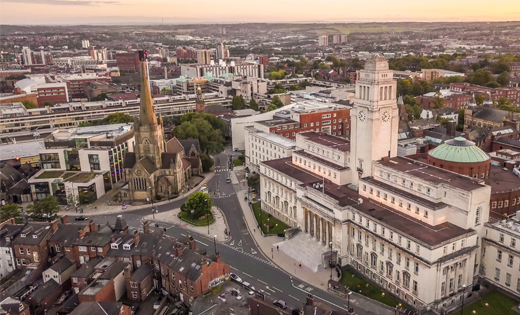Inside Track | University of Leeds Climate Plan and Net Zero Plan
Our Vice-Chancellor, Professor Simone Buitendijk, and Deputy Vice-Chancellor, Professor Hai-Sui Yu, share an update on our Climate and Net Zero plans.

The climate crisis is the most significant global challenge we all face. At the University of Leeds, we proudly bring together world-leading expertise in all the key strands of climate research to effect change – but it’s also our responsibility to look at what we are doing within our own institution to address this threat to our planet.
That is why, back in 2019, the University announced its seven principles to tackle the climate crisis – including our aim of having no direct carbon emissions by 2050 and achieving net zero greenhouse gas emissions by 2030. One element of implementing our principles was to formulate an overarching Climate Plan which would set out both work that is already in train and progress to date, along with how we go from here to deliver net zero in a way that is achievable, with defined interventions and an associated investment plan.
Next month, the Climate Plan will be put to Council for its review. The plan is the culmination of years of research, scoping and engagement with academics and our partners. Given the critical importance of climate action at the University, it is right that we have taken the time to develop a plan that is ambitious, specific and deliverable – a plan that ensures the University shows leadership and helps deliver a sustainable, low carbon future.
A vital component of the Climate Plan is a Net Zero Plan, which sets out how we will achieve net zero greenhouse gas emissions by 2030. It considers a number of pathways to help us reach this goal – including direct emissions from owned or controlled sources, indirect emissions from the generation of purchased energy, and business travel and commuting. It also presents a preliminary post-2030 ‘net zero plus’ strategy to bring a wider set of emissions into scope, including student travel, and to achieve an overall zero emission target.
Our Net Zero Plan makes the case for an integrated approach across the University, underpinned by cooperation, empowerment and widespread communication across all staff and students, and requiring the single largest investment in our history. This investment, combined with a focused strategy, can deliver a sector-leading, rapid and just transition to net zero.
Our 2020 baseline for emissions covered by the net zero target is 71,546 tCO2e1 and our pathway will reduce this by around 70%. The remaining emissions will need to be offset in a credible way. An annual review by the Priestley International Centre for Climate will look to heighten ambition across all elements of the plan, to further reduce this 2030 offset figure and make sure future offsets are academically verified as net zero compatible. Additional reduction targets linked to the University’s farm will be announced in the next couple of years, and will increase this planned reduction.
We will share more detail on the finalised Climate Plan and Net Zero Plan once Council has had the opportunity to review them. It is also important to stress that the plans will develop over time, just as the broader climate crisis, to which they are a response, will develop over time. Specifically, some of the costings may need to be worked through in more detail, to make sure we are putting the right money in the right place to have the right effect.
As Vice-Chancellor and Deputy Vice-Chancellor, we want to thank everyone who has been involved in this to date. Our plan has been developed and scrutinised by our academic and professional taskforce, and we have seen first-hand the passion and determination by colleagues to work through some of the difficult issues and compromises that will need to be made to deliver our net zero ambitions.
Whilst the steps we can take to get our own house in order may be seen as a drop in the ocean, we need to be prepared to play our part in addressing this crisis in this way. By making rapid progress towards net zero we can help deliver our strategic commitment to community, culture and impact and the move to a values-driven University… one that harnesses its expertise in research and education to help shape a better future for humanity, working through collaboration to tackle inequalities, achieve societal impact, and realise a fairer future for our wider community.
Professor Simone Buitendijk
Vice-Chancellor, University of Leeds
Professor Hai-Sui Yu
Deputy Vice-Chancellor